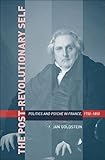The Post-Revolutionary Self : Politics and Psyche in France, 1750-1850 / Jan GOLDSTEIN.
Material type: TextPublisher: Cambridge, MA : Harvard University Press, [2009]Copyright date: ©2005Description: 1 online resourceContent type:
TextPublisher: Cambridge, MA : Harvard University Press, [2009]Copyright date: ©2005Description: 1 online resourceContent type: - 9780674016804
- 9780674037786
- Ego (Psychology)
- Middle class -- France -- History -- 18th century
- Middle class -- France -- History -- 19th century
- Monomania
- Psychiatry -- France -- History -- 18th century
- Psychiatry -- France -- History -- 19th century
- Self -- Social aspects -- France -- History -- 18th century
- Self -- Social aspects -- France -- History -- 19th century
- HISTORY / Europe / France
- 155.2094409033
- RC450.F7 -- G65 2005eb
- online - DeGruyter
- Issued also in print.
| Item type | Current library | Call number | URL | Status | Notes | Barcode | |
|---|---|---|---|---|---|---|---|
 eBook
eBook
|
Biblioteca "Angelicum" Pont. Univ. S.Tommaso d'Aquino Nuvola online | online - DeGruyter (Browse shelf(Opens below)) | Online access | Not for loan (Accesso limitato) | Accesso per gli utenti autorizzati / Access for authorized users | (dgr)9780674037786 |
Frontmatter -- Contents -- List of Illustrations -- Preface -- Introduction: Psychological Interiority versus Self-Talk -- I. THE PROBLEM FOR WHICH PSYCHOLOGY FURNISHED A SOLUTION -- 1. The Perils of Imagination at the End of the Old Regime -- 2. The Revolutionary Schooling of Imagination -- II. THE POLITICS OF SELFHOOD -- 3. Is There a Self in This Mental Apparatus? -- 4. An A Priori Self for the Bourgeois Male: Victor Cousin's Project -- 5. Cousinian Hegemony -- 6. Religious and Secular Access to the Vie Intérieure: Renan at the Crossroads -- 7. A Palpable Self for the Socially Marginal: The Phrenological Alternative -- Epilogue -- Notes -- Note on Sources -- Index
restricted access online access with authorization star
http://purl.org/coar/access_right/c_16ec
In the wake of the French Revolution, as attempts to restore political stability to France repeatedly failed, a group of concerned intellectuals identified a likely culprit: the prevalent sensationalist psychology, and especially the flimsy and fragmented self it produced. They proposed a vast, state-run pedagogical project to replace sensationalism with a new psychology that showcased an indivisible and actively willing self, or moi. As conceived and executed by Victor Cousin, this long-lived project singled out the male bourgeoisie for training in selfhood --Cousin and his disciples deemed workers and women incapable of the introspective finesse necessary to appropriate that self in practice.
Issued also in print.
Mode of access: Internet via World Wide Web.
In English.
Description based on online resource; title from PDF title page (publisher's Web site, viewed 08. Jul 2019)


